Cultivating Change: Vertical Harvest CEO Talks Urban Farming, Local Impact, and Sustainable Futures
Founded in Jackson, Wyoming in 2016, Vertical Harvest stands out as a pioneering force — fusing architectural imagination, sustainable agriculture and a commitment to inclusivity. Our CEA Q&A with CEO Nona Yehia explores the design principles and sustainability initiatives shaping her company’s growth, its newest projects in Westbrook, ME, and Detroit, MI and the meaningful difference the Vertical Harvest “Grow Well” model is making on the lives of individuals with disabilities. From redefining “local” in food production to utilizing sustainable practices, Vertical Harvest has emerged not just as a trailblazer in controlled environment agriculture, but as a leader dedicated to feeding communities and fostering a brighter, more inclusive future.
As an accomplished architect, you brought your vision of North America’s first vertical hydroponic greenhouse to life with your flagship farm in Jackson, Wyoming in 2016. Could you share the key design and sustainability principles that guided the development of Vertical Harvest, and how these principles align with the company’s broader mission?
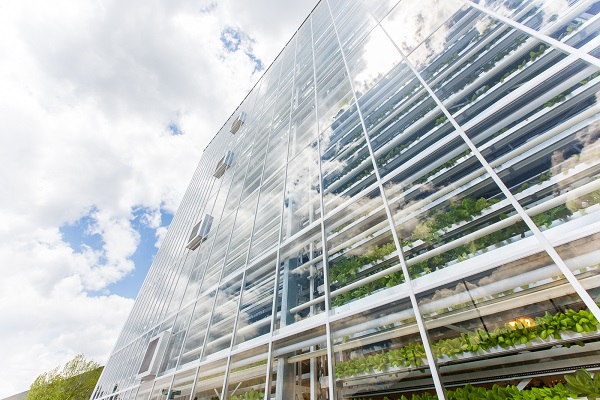 Our first farm in Wyoming started with a simple mandate: responsibly grow as much food as possible within our community (which has a four-month growing season and imports 90% of the food we eat) and to create job opportunities for people who live in our community, especially ones who suffer overwhelming unemployment rates, like people with disabilities. Our goal was to pursue both missions simultaneously, year-round via indoor growing, and work within the parameters of a city very scarce on available land and with a seasonable economy/labor pool.
Our first farm in Wyoming started with a simple mandate: responsibly grow as much food as possible within our community (which has a four-month growing season and imports 90% of the food we eat) and to create job opportunities for people who live in our community, especially ones who suffer overwhelming unemployment rates, like people with disabilities. Our goal was to pursue both missions simultaneously, year-round via indoor growing, and work within the parameters of a city very scarce on available land and with a seasonable economy/labor pool.
And as an architect I’ve always been driven to try and understand the systems that build communities, how they support people, and conversely how they fail people, so it was amazing to dig into this in my own backyard. And I’ve rooted my career in the notion that the buildings and systems that make up the fabric of our cities, can and should be designed to meet the challenges of the 21st century – and be designed to serve all members of our 21st century society, especially those on the margins. States and cities are also recognizing that we need to do things differently, we need different approaches to climate adaptation as traditional agricultural systems come under greater stress.
Efforts to re-localize food production will be one of these different approaches and is a growing trend. As is indoor agriculture that can provide increased yields using fewer resources and climate proof our food supply against extreme weather.
So that’s how we became vertical farmers, designing and operating large scale indoor urban farms that grow better food and futures. We’ve seen how our farm is a new type of infrastructure that embodies conscious and radical inclusion — amplifying the voices of all to cultivate a new and burgeoning industry.
Vertical Harvest is expanding into different locations, such as the Westbrook, Maine farm and the recently announced project in Detroit. Can you share more about these projects and how they align with your mission of “feeding locals first” and supporting local food economies?
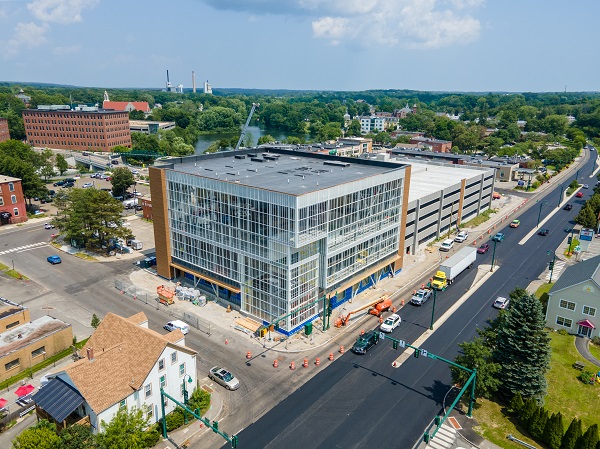
We imagine and advocate for a food system where everyone has the right to healthy food. Our goal to “feed locals first” prioritizes 70% of our produce going to customers within 150 miles of our farms — for the record we don’t call 400 miles “local” — and to meet the needs of the communities we’re growing in before we tap into wider distribution networks. To achieve this we look at the entire “community-as-our-customer” – so not just retail but also the small and medium businesses that make up the local culinary community as well as stalwart community institutions like hospitals, school systems, nursing homes and college campuses. On top of that we aim to divert 4 – 5 % of our farm’s total output specifically into low-income, low-access (LILA) channels, like food rescue operations and the charitable pantry system.
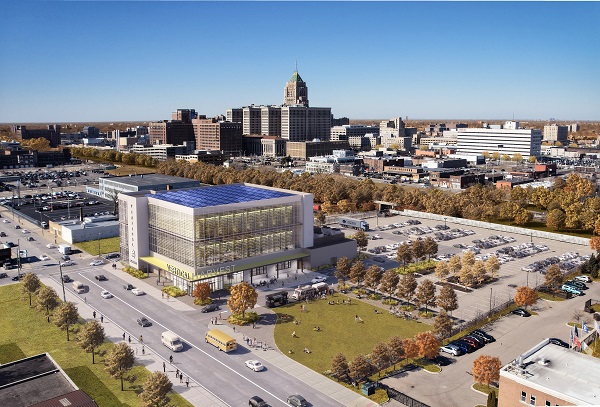
Because of this focus on local food going to local folks, our farms are intentionally built within urban areas to both bolster the local food system and address food insecurity in the same communities where we farm. Our goal then becomes to replicate this mission across a national network of local farms. This is true in Westbrook, ME, a city in and of itself within the greater Portland Metro area, where we expect to be a meaningful contributor to the New England Food Vision of growing 30% of food locally by 2030. And it’s definitely true in Detroit, where we’re building in the Milwaukee Junction neighborhood with Bedrock Detroit. We’re very excited about exploring an even deeper level of opportunity there to imagine how we can use our farm to connect with all of the revitalization and infrastructure investment happening in that city (coincidentally, also my hometown and recently voted the #1 city in the world for start-ups).
Your commitment to employing people with disabilities and focusing on their abilities is inspiring. Can you elaborate on the impact this approach has had on the lives of your employees and how it has enhanced your company’s performance and mission?
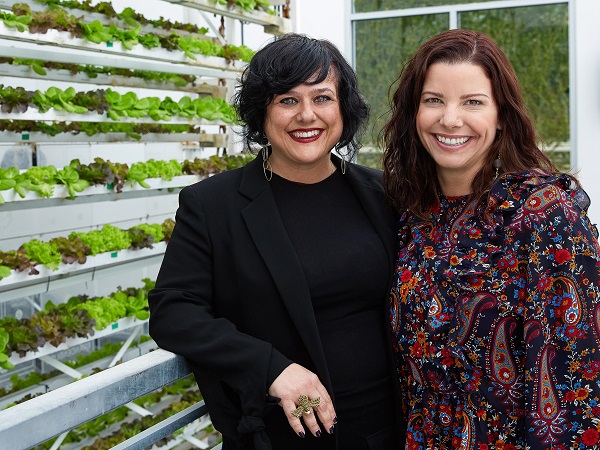
Employing people with disabilities is personal. I grew up with a brother with developmental disabilities and from an early age, I observed how society treated him differently, with less opportunities. So when we set out to build the country’s first indoor vertical greenhouse, we wanted to implement a one-of-a-kind workforce model, too. Together, with my co-founder, Caroline Croft Estay – a former case manager in Teton County– we imagined “Grow Well,” a customized employment model fostering professional development, personal discovery and community impact. This person-centered approach aligns professional, personal and community components of the workplace to ensure the development of job skills, growth, accountability and engaged citizenship.
Across the country people with disabilities suffer on average an 80% unemployment rate, but at our farms we start by focusing on ability vs disability. And 40% of our folks are
differently-abled. For some we’re they’re first experience of meaningful and stable employment they’ve been offered. Others, even those with college degrees, often found themselves offered only entry level positions like cleaner or dishwasher.
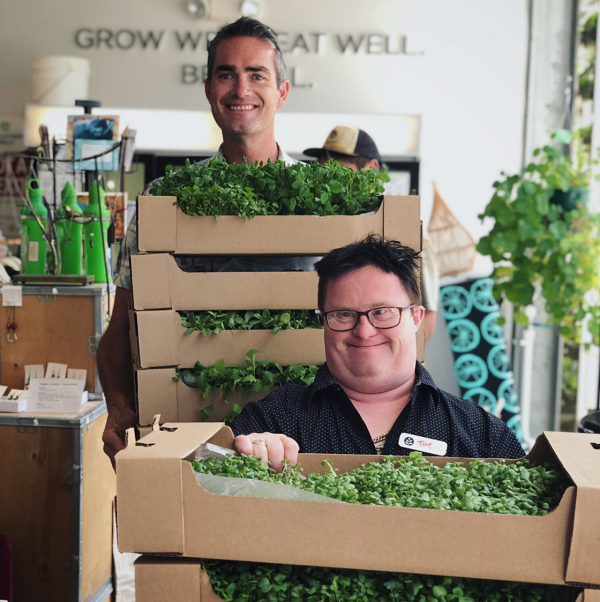 In our 7 years of operation we’ve helped employees open bank accounts, sign their first lease, reverse evictions, get their driver’s license, earn back their guardianships and acted as health advocates as employees work to coordinate care across multiple doctors and health systems. These are real outcomes of our Grow Well customized employment program that we’re intensely proud of….
In our 7 years of operation we’ve helped employees open bank accounts, sign their first lease, reverse evictions, get their driver’s license, earn back their guardianships and acted as health advocates as employees work to coordinate care across multiple doctors and health systems. These are real outcomes of our Grow Well customized employment program that we’re intensely proud of….
But also, our commitment to our people is an absolute brand differentiator. We like to say people come to the farm because they like our story, but they come back because of the quality of the product. We’re not in this for pity pennies – in fact that would undermine our whole mission to prove that neurodiverse minds, different life experiences and a range of perspectives make for stronger teams. And the fact that we are able to weave a great product and a great purpose together earns us tremendous brand loyalty and love.
Sustainability is a key focus for Vertical Harvest. Can you share some of the sustainable practices and technologies you implement in your operations and how they contribute to reducing environmental impact?
We’re committed to continuous improvement and innovation to enhance our own sustainability and in the indoor ag industry at large. We’re collaborating with the Resource Innovation Institute and the American Council for an Energy Efficient Economy to create the first of its kind benchmarking report for the CEA sector. This USDA-grant funded program is collecting 4 years of data to inform the strengths and weaknesses of production methods. Additionally, our Wyoming facility acts as an R&D lab to test strategies for maximizing yield, including crop-specific growing and harvesting techniques like optimal lighting, climate controls, rack density and crop transport automation. Our work in that farm has been recognized by the Office of Energy Efficiency and Renewable Energy (EERE) and the U.S. Department of Energy for our sustainable approach to natural and supplemental lighting. And then all future “next generation” farms are designed to be 100% electric. We like to say as the grid gets greener, so are we. And we’re always trying for more sustainable sourcing from our suppliers and keep a close eye on new technologies that enter the market.
What’s next for Vertical Harvest?
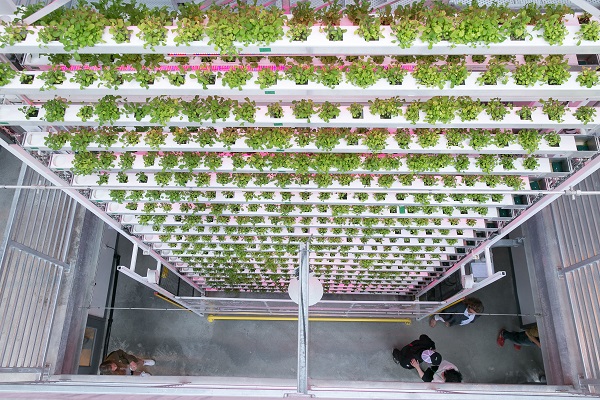 We have a roadmap for expansion – in addition to Maine opening and Detroit breaking ground next year, we hope to be announcing another 1 – 2 farms as well. Every farm will share some core features (like the Grow Well model and a commitment to prioritizing local), but also with a level of customization so each farm can adapt to the specific needs of the community they’re rooted in.
We have a roadmap for expansion – in addition to Maine opening and Detroit breaking ground next year, we hope to be announcing another 1 – 2 farms as well. Every farm will share some core features (like the Grow Well model and a commitment to prioritizing local), but also with a level of customization so each farm can adapt to the specific needs of the community they’re rooted in.
The needs of local ethnic communities and their culinary heritage is a great example, and we’re already trialing certain herbs and aromatics that are being requested in Maine. So, just as the farm in Jackson is a reflection of our western heritage and abundant outdoor adventure scene, the farm in Westbrook, ME will take on its own personality adapting to its place, space and culture. And of course, that goes for Detroit too and all our future farms as well, because we believe hope lies in the local. We know that real community is built through the tables we set, who we make a place for and the love and care and nourishment that gets mixed into every dish. We’re excited to dig in!
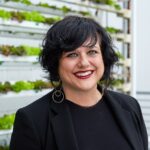 About Nona Yehia
About Nona Yehia
An accomplished architect by training, and principal of GYDE Architects in Jackson Hole, WY, Nona designed North America’s first vertical hydroponic greenhouse and founded Vertical Harvest Farms. Alongside her co-founder, Caroline Croft-Estay, Nona pioneered an inclusive, customized employment model for people with physical and/or intellectual disabilities. Vertical Harvest grew from Nona’s experiences growing up with a brother with developmental disabilities, love of fresh and local food, obsession with great design, and long-standing community involvement. Nona’s dynamic leadership style has led to recognition as a CNN Champion of Change. She is a Tony Hsieh Award Fellow and a Cities Member on World Economic Forum’s Global Future Council. Vertical Harvest is a 2x finalist for Fast Company’s Best Places to Work for Innovators. Nona graduated from the University of Michigan and earned a Masters degree in architecture from Columbia University’s Graduate School of Architecture, Planning and Preservation. She resides in Jackson, WY.
Learn more about Nona and Vertical Harvest —visit the company website.
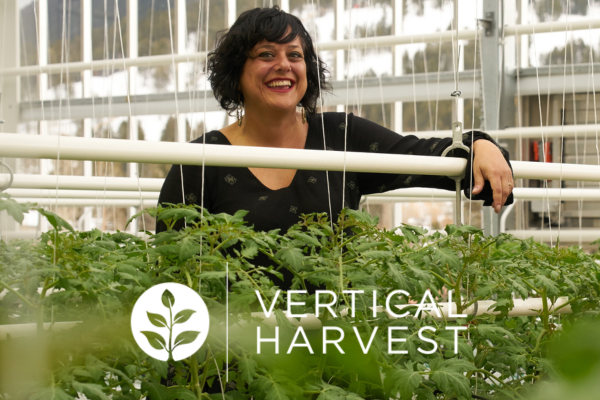
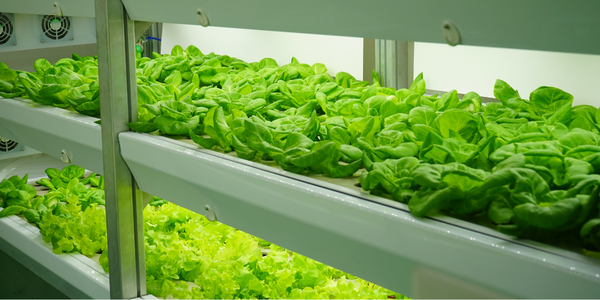

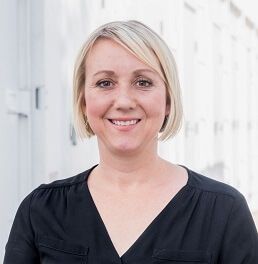



 The NGA Show,
The NGA Show, 
 This fall,
This fall,